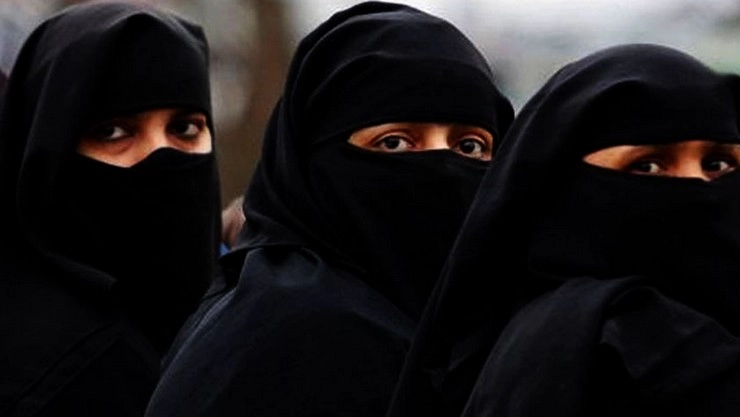How Three Muslim Women of Northeast Delhi Were Caught In A Legal And Financial Nightmare

By Arbab Ali, TwoCircles.net
On her wedding day, Tabassum was issued an arrest warrant for missing a court hearing. The previous day, November 10, 2022, she skipped the hearing as she had to prepare for her wedding. The 25-year-old was terrified, but her lawyer intervened to prevent her from being taken into custody.
On March 14, four months later, TCN met Tabassum, who goes only by her first name, at Karkardoma Court in east Delhi, along with two of her friends, Nilofer, 23, and Imran Fatima, in her early 40s. Standing outside the courtroom for yet another hearing, the trio’s gaze was fixed at the end of the alley, waiting for 'Gul' (Gulfisha Fatima), from their neighbourhood of Jaffrabad in northeast Delhi, to appear, accompanied by jail officials.
Gulfishan Fatima, a prominent activist in the anti-CAA (Citizenship Amendment Act) movement, has spent over three years in jail for her alleged role in the 2020 northeast Delhi riots.
While Tabassum, Nilofer, and Imran were fortunate not to have been arrested, their life has permanently changed ever since they too were charged with participation in the riots that hit northeast Delhi between February 22 and 24, 2020. The Delhi Police had registered 758 FIRs and 414 chargesheets, and arrested 2,615 people in the aftermath of the riots that took place after the anti-CAA protests.
The three friends were booked under eight sections of the Indian Penal Code (IPC), including rioting, assault, disobeying an order of a public servant, and promoting enmity between different groups on February 23 2020, a day after they were detained from the Jaffrabad Metro station.
The area around the metro station had become the site of an all-women sit-in protest, similar to Shaheen Bagh, as part of the anti-CAA movement.
The Delhi Police claims that the protests in Jaffrabad were instrumental in causing communal unrest in the city.
Attending court proceedings is straining the families’ finances
Jaffrabad is a densely populated neighbourhood of Muslim migrants from Uttar Pradesh, Bihar, and West Bengal. They work in garment manufacturing units, bakeries, and other small Muslim-owned businesses. Jaffrabad's roads are lined with potted manholes, the houses are small, and the neighborhood is bordered by a big naala (drain), a distinctive feature of Muslim ghettos in Delhi.
Nilofer’s father drives a chota haathi (a transport tempo) and is the only breadwinner of the family. She has six sisters and has studied till Class XII.
Tabassum has done a BA from Delhi University. Her husband works as a salesman and earns around Rs 25,000 a month.
Imran Fatima, who is in her early 40s, has studied till Class X. Her father is the sole earning member of the family. He works in a garment factory.
Attending court proceedings is straining the low-income families’ finances. Nilofer commutes to the court by metro or auto, which costs her about Rs 200-300. Aside from that, she has paid close to Rs 16,000 for various legal expenditures to her previous lawyer. Nilofer’s grandmother too has been booked in connection with the protests. "She is 92 years old. She, too, must attend court hearings," Nilofer explained.
Tabassum has been commuting to the court from Jahangirpuri, her in-laws' home, since her marriage. She first takes an auto to Seelampur, which costs around Rs 150, and from there she picks up her mother, who is also charged in connection with the protests, and then goes to court. She spends close to Rs 500 on each court hearing.
Nilofer, like Tabassum, skipped two court dates last year to visit her sister in Mumbai and a warrant was issued for her arrest.
Never heard about ‘chargesheet’ before the case
During a court appearance in early March, Nilofer, who also goes by her first name only, received a phone call in the otherwise silent courtroom. Nilofer began talking to her friend who had called her without a care in the world. The judge ordered the bailiff to take away her phone. "They wasted my three hours," she complained. Around 5 pm, Nilofer received her phone back.
Imran Fatima had never heard the term “chargesheet” before she was summoned to appear in court in October 2020. “It took me a long time to understand the charges against me and other legal issues," she said.
Tabassum needed more than a week to read the chargesheet in her case. More educated of the three, she helped her friends make sense of the charges listed against them.
"Baji (Tabassum) used to highlight important information in the chargesheet and send it to me," Nilofer explained.
Family and neighbors concerned about marriage prospects
Nilofer said her parents have been supportive of her throughout the court proceedings. "My parents always told me that we did nothing wrong and that I shouldn't be afraid," she said. But her neighbours have treated her differently. Some have begun to distance themselves from her, while women in the mohalla are concerned about her marriage prospects.
Before her marriage, Tabassum had to deal with similar issues. "We tried to keep information about the case private. We didn't tell anyone in the neighborhood," she explained.
Nilofer and Fatima believe their cases will drag on for long, at least the next 5-6 years.
When asked if she has faith in the system, Tabassum replied, "I have faith in Allah."
Arbab Ali is a fellow at TCN-SEED mentorship programme.
